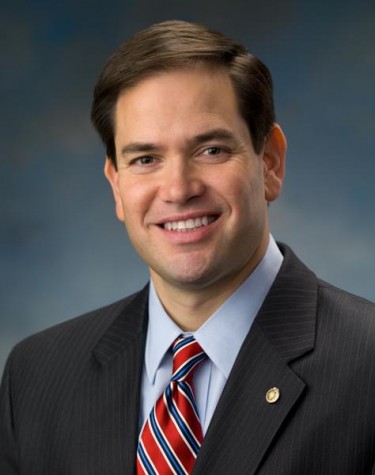Everything You (Really) Need to Know About the 2016 Presidential Election
October 13, 2015
Election season is just around the corner, and it is about to take America, yet again, by political storm. Only a few months ago it seemed like the 2016 presidential election would be yet another battle between the Clinton and Bush dynasties, jockeying for position in a race that we’ve all pretty much seen and read about before. Instead, what your average American voter is looking at right now is a muddled and bewildering mix of democratic socialists, libertarians, CEOs, a retired neurosurgeon, a reality TV star, and a veritable catalog of really bad haircuts.
Mr. Trump, Mr. Sanders, we’re looking at you two.
Putting aside their appearances and quirks, however, the point is that these candidates are not the usual crop of career politicians. The 2016 season is a season full of dark horses – many of which are doing surprisingly well. Let’s dive into it.
The Democrats
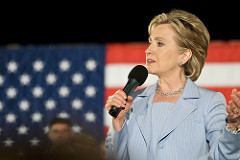
Creative Commons photo source: https://www.flickr.com/photos/kakissel/2464038263/
The race for the Democratic nomination is dominated by, as expected a year ago, Hillary Clinton. The latest USA Today survey of the American people on October 1st polled her future voting percentage at 41%, the clear front-runner at present for the Democratic Party, an entire 18% ahead of her closest rival. The thing is, this lead used to be 35% in the September 1st poll, and 45% in the July poll. The idea that Clinton’s presidency is inevitable has been consistently eroded by the growing support of her two other major political rivals in the Democratic Party.
As far as policy goes, Clinton’s fiscal ideas seem a lot like Obama’s, with a focus on strengthening the middle class and families. Socially, she also resembles our current president, with liberal stances on gay marriage, abortion, and marijuana legalization. Clinton has focused, more than any other candidate, on women, and has addressed social issues popular with this demographic. Clinton’s main hurdle right now is slowing her decline in the polls, and distancing herself from a number of political scandals with which her political rivals continue to bash her.
In a Nutshell: Clinton is a moderate, establishment Democrat, similar to President Barack Obama. She is still the favorite to win right now, but her polling numbers have been consistently waning these last few months. But the bottom line is that she remains the Democratic front-runner.
—
Creative Commons photo source: https://www.flickr.com/photos/tabor-roeder/21581179719/
Clinton’s only real, viable Democratic rival who has officially entered the race is Vermont senator Bernie Sanders, the only independent in congress, and a self-described Democratic Socialist. That’s right, socialist; a grave insult in some more conservative parts of the country, but it is a label which he thinks describes his position best. That sort of attitude may be why he has attracted 23% of the USA Today poll — he has presented himself as the honest and consistent candidate in an occupation associated with, in the minds of many Americans, bribery, corruption, and scandal. Sanders has declined to use a Super-PAC (a fund that can take unlimited money from corporate and private interest groups) in a show of protest against Clinton in particular, who has been heavily funded in her campaign by banks and other corporate interests. His social policies run in line with many other more moderate democrats, but his fiscal policies are where many voters may be turned off of Sanders.
His far-left positions include support for a universal single-payer healthcare system, free secondary education, and a $15 minimum wage. These positions will win him lots of support from the younger, college-aged crowd and liberals who are tired of today’s moderate establishment Democrats, but he may have problems in the south and in more conservative areas, considering that “socialist” is considered a slur in many circles.
In a Nutshell: Sanders is the independent liberal candidate for those who are tired of the political game and lean much more to the left politically. Many fear that his unapologetically socialist stance makes him unelectable, but his polling numbers have risen inverse to Clinton’s.
—
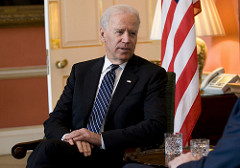
Creative Commons photo source: https://www.flickr.com/photos/cabinetoffice/8447796390/
The only other viable candidate for the Democratic nomination is former Vice President of the United States Joe Biden, though he has not at this point officially declared his run for office. Many in the political sphere more or less expect him to, though, and he has been polling a little below Sanders in recent Pew statistics. He is likely to tap into the same voter base as Clinton (those in the mainstream Democratic party) and will draw votes away from her in the primary, but Clinton still seems to come out ahead.
In a Nutshell: If Biden does choose to run, he will be a viable candidate – though, he may end up playing as a spoiler candidate to draw support away from Clinton.
***
The Republicans
There are a lot of people running for the Republican nomination. A lot. Other candidates definitely have important roles to play in this election, but to make things easier, here are just 3 of the most popular and most likely Republicans to win the nomination, according to recent polls.
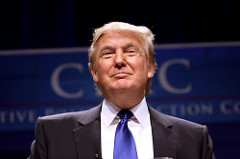
Creative Commons photo source: https://www.flickr.com/photos/gageskidmore/5439999805/
According to the latest Pew Research poll on October 2nd, reality-TV billionaire Donald Trump leads the Republican race by 9%, outside of the margin of error for the poll, at a solid 25% of the total opinion poll. The real-estate mogul was treated as a fringe candidate until his rousing speeches and hardline conservative stances on immigration won him massive support in the polls. Some of his more famous positions include the support for the construction of an enormous wall spanning the entire US – Mexico border, as well as enthusiastically fighting for the immediate deportation of 12 million illegal immigrants from America back to their home countries. Trump is brash, fiery, and unapologetically opinionated, and likely appeals to the middle-American voter who is, like the Sanders voter, tired of the old political game.
In a Nutshell: Once almost a joke candidate, Trump is now a serious front-runner for the Republican nomination. He is riding a populist movement, like Sanders, and appeals to the “silent majority” of the GOP. Only time will tell if his popularity has any solid staying power in the real election.
—
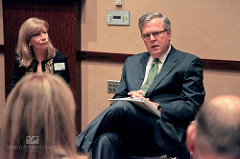
Creative Commons photo source: https://www.flickr.com/photos/wacphiladelphia/8033617557/
The most “old establishment” candidate for the Republican Party would be the third in his family to obtain the Republican nomination – Jeb Bush. With 4% of the current poll percentage from the same Pew Research poll in which Trump received 25%, the case seems hopeless – however, it is not clear how Bush’s status as the party’s establishment poster boy will affect his polling going forward. Bush’s platform is that of the consummate conservative – limited concern about human-caused climate change, expansion of gun rights, state decisions on marijuana legalization if not an outright federal ban, banning of abortions after 20 weeks – if you commonly vote Republican, Bush is nothing new. His pet issue that contrasts with his more conservative views is the support for providing an easier route for a legal status for illegal immigrants, but not citizenship.
In a Nutshell: Jeb Bush is the candidate that the mainstream, establishment Republican Party as a whole would much prefer over more fringe elements of their party – his positions and style of governance would be much the same as the previous presidents in his family – George H.W. Bush and George W. Bush. One big challenge for his presidential run is winning the support of voters experiencing “Bush fatigue”, as his previous family members in the White House have alienated some elements of the Republican constituency. He is the candidate for old-school Republicans.
—
Photo source: http://www.rubio.senate.gov/public/index.cfm/official-photo
The last likely Republican nominee detailed in this trio is Marco Rubio, a senator from Florida who represents a younger, ethnic Republican base, with 8% in that Pew poll. He is new on the political scene, often likened to Obama in 2008, and is as such a fresh new face for the party. Despite being strangely anonymous at this stage in the race, Rubio is definitely a solid front-runner for his party, as he appeals to Hispanics and Latinos often ignored by Republicans with a mostly white, rural base. He leans left on immigration, a son of Cuban immigrants himself, and as such has alienated himself a bit from some in the Republican Party – however, he is still conservative on most other social and fiscal issues that matter to the average conservative voter in this country.
In a Nutshell: Rubio bridges the generational gap, and appeals to younger, more diverse voters in a way that those like Bush and Trump have not and probably can not. It will be interesting to see how he fares in polls as the race continues to ramp up.
***
In summary, although it’s still early in the race, some things are becoming clear: Trump and Sanders both have been doing very well with populist strategies, appealing to the average man and woman. Sanders, in particular, has been gaining impressive financial support from regular individuals, instead of wealthy donors and large corporations.
In fact, Sanders recently passed the record for small donations in a presidential campaign, blowing past Obama’s previous record with more than $26 million raised from all over the country. Similarly, Trump’s success in the polls probably has a great deal to do with the fact that he is not constrained by an overarching ideological party, and instead appeals to an enormous middle-American silent majority in the country.
While it may seem incredibly unlikely that this election will turn out to be between a fringe socialist candidate and a former host of a reality TV show, they are both candidates to watch closely as the race moves forward. Simply put, this election will be much more than another Bush vs. Clinton war.



